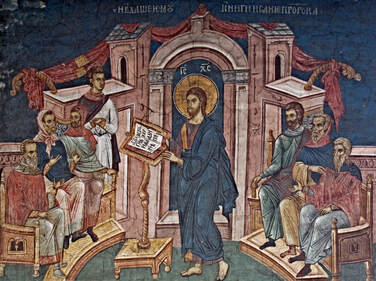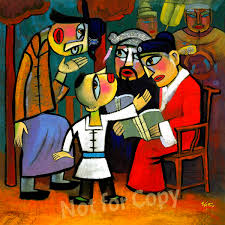
The first sermon preached by a minister is a memorable and pivotal moment in the life of a newly-minted preacher. You have been educated up. Call by God to proclaim the word. You have spent hours praying and studying the text. More study and pray time then poured in the actual preparation of the sermon – some estimate 1-2 hours for every page. Some gifted preachers are able to commit the sermon to memory. Others slave over a manuscript, making sure every “t” is crossed and “I” is dotted. We worry whether the message is too long, if it is appropriate, or will be well received. We practice, pouring our hearts into the words and praying the spirit will transform them into living message that touches the congregation’s heart. Then there are the comments,
One new preacher noted: when he got in the pulpit he thought he should explain why he had a Band aid on his chin. "As I was shaving this morning I was thinking about today's message when I lost my concentration and accidentally cut my chin with the razor." He then went on to preach for over an hour ½ hours. Afterwards an old lady said to the new pastor, "Pastor, next week why don't you think about your shaving and cut the sermon."
The new preacher, at his first service had a pitcher of water
and a glass on the pulpit. As he preached, he drank until the
pitcher of water was completely gone.
After the service someone asked an elderly church member,
"How did you like the new pastor?"
"Fine," she said, "but he's the first windmill I ever saw that
was run by water."
Then we have the example of Jesus, who comes forth filled with the power of the Holy Spirit, having spent time of discernment and temptation in the dessert. Even Jesus must face the test of the first sermon. He prepared for forty days and forty nights. He returns to Galilee teaching in the synagogues and is well received. Favorable reports have spread about him. Then he hits his home synagogue, in Nazareth.
Jesus is ready for his first sermon in his hometown. The crowd is ready and in suspense. Jesus is given the scroll from the prophet Isaiah, chapter 61, to read, and deliberately selects the text proclaiming “The Spirit of the Lord is upon me...” then proceeds to announce a mandate:
- To bring good news to the poor.
- Proclaim release to captives and prisoners.
- Recovery of sight to the blind.
- Let the oppressed go free.
Now the Jubilee year was never successfully, fully implemented. It was too complicated, too difficult to follow. There were minor attempts, here and there throughout history. Yet it is this very law that Jesus chooses to discuss in his first sermon at Nazareth. Eyes fixed on him in anticipation; Jesus gives what must be the shortest sermon in recorded history: “Today this scripture has been fulfilled in your hearing.”
What is Jesus declaring? He announces to the people, right from the beginning of his ministry that this unobtainable mandate, this the living out of God’s favor in human time, is fulfilled in Jesus. Jesus certainly fulfilled George Burns’ notion of a good sermon, when he quipped: “The secret of a good sermon is to have a good beginning and a good ending; and to have the two as close together as possible.”
Still, it must have been electrifying to hear Jesus’ words. Electrifying like when the Jewish exiles returned home to Jerusalem. Recall how they felt when they gathered to hear the scriptures read by the priest Ezra. They heard the interpretation of what it meant to be a covenant people returned to their home. Both Nehemiah the governor and Ezra the priest told the people, who were bowing and worshipping upon hearing the Law of Moses, not to weep. But the people wept because their heard their heritage read to them. God’s promise to be faithful was fulfilled on that day. It was a new day. They could now start over. Remember, Ezra told them, “the joy of the Lord is your strength.”
So, Jesus, like Ezra, preaches a word for an oppressed people to understand and for which their hearts long for. Like the exiles who had returned home to rebuild the ruins, to resume life, to reclaim their spiritual heritage, the people in Nazareth are being called by Jesus to join him to fulfill the word Jesus spoke – messianic words from an ancient prophet, built on the Law of Moses. The year of God’s favor, Jubilee, was declared by Jesus. The impossible, unfulfilled law, now in Jesus is fulfilled.
Jesus could have chosen his first sermon about prosperity. He could have chosen a fire and brimstone text. But he didn’t. Instead he chose this difficult text, at least unattainable by human means. Who wants to forgive debt? Who wants to return land? Who wants to release slaves? Who wants the land to rest? This is a hard choice for those who are rich and prosperous. We need God to achieve this act, to bring equality and justice to us all. To live faithfully. For oppressor and oppressed to become reconciled. Slave and freeman become equal. For rich and poor to experience connectedness, sharing based on need and not greed.
Jesus is God’s Jubilee. Jesus brings God’s eternal restoration. Everything Jesus does is to fulfill God’s favor. In Jesus God forgives eternal debt. In Jesus God offers freedom. In Jesus God grants creation rest. In Jesus sets the enslaved free. What is Jesus’ sermon? Jubilee is fulfilled in Jesus’ midst.
Jesus’ first sermon was his vision for his entire ministry, and what he wants for us. Jesus is preaching to us today – to be fulfilled. For all of us are captives to one thing or another. Sin. Greed. Self-centeness. All of us are blinded by one thing or another. Ignorance, Spiritual or emotional pain. All of us are oppressed in some fashion – by our upbringing. By the hard-knocks of life. Our lack of knowledge of the Word of God. By health or financial conditions. Why, many of us are even blinded to the ways our lives are oppressed or held captive to either sin or conditions that would leave us unfulfilled. Jesus proclaims he is here to fulfill us. To enable us to see. To become free. To hear good news. To know God’s favor.
Jesus’ first sermon in Nazareth echoes timeless themes that our hearts can still grasp and pray for. As we gather for our annual meeting today, let Jubilee be our goal and theme, That we can declare Jubilee, create Jubilee, a time of forgiveness, to begin over in God’s grace. Jesus’s word’s open us to embrace the conditions of the oppressed and refugees clamoring to be free around our word. That’s what our congregation needs. Our Community needs. The World needs. The message of Jubilee.
Jesus word’s opens our eyes to our spiritual blindness, and to see what we are overlooking, and see our blindness to other’s struggle, the needs of our community. Because there is plenty in this world for all to have a simple, decent life. If we just have eyes to see.
Jesus’s words awaken us to Jubilee, the freedom to have a fulfilling life, with a social and spiritual structure that supports us instead of working against us. To be free from the yoke of sin. To experience spiritual freedom and not oppression. We feel the oppression of financial problems, building issues, but Jubilee finds us in our pain, and our fear, and brings us hope. Jubilee brings us rest to enable a vision of a new time to manifest, to call us to declare, “the joy of the Lord is my strength,”
These are freedoms that Jesus laid out in his first sermon. A vision that all peoples could be fulfilled. This is a sermon worth pondering, re-reading, holding on to and signing up with. It is a sermon Jesus lived, died and rose to fulfill. May we embrace the Jubilee, so it can be fulfilled in our time. Amen.




 RSS Feed
RSS Feed